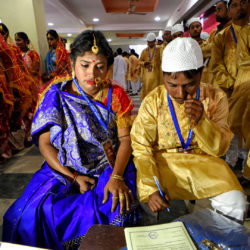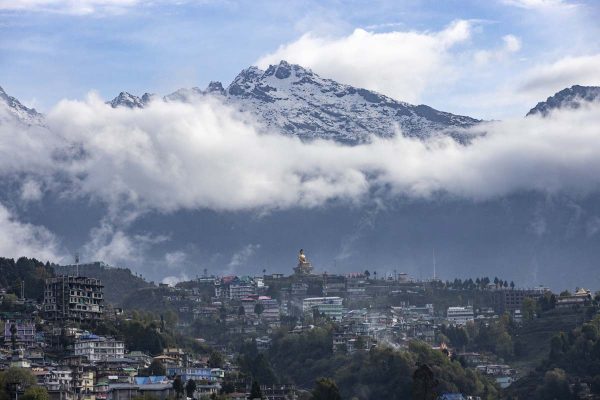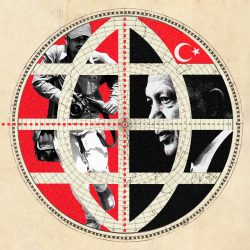
SAJJAD HUSSAIN/AFP via Getty Images
Why India’s defamation laws are hurting its democracy
On April 3, Rahul Gandhi, a son, grandson and great-grandson of former Indian prime ministers, showed up in Surat, an industrial city in the Indian state of Gujarat, to appeal his conviction for defamation and the two-year sentence that has resulted in his automatic disqualification from India’s Parliament. Gandhi, the face of the opposition Congress party, was accompanied by his sister and prominent party leaders. There were streetside protests in Surat by Congress supporters, as there have been around the country since March 23 when Gandhi was convicted.
It was, tweeted India’s minister of law and justice, a member of the governing Bharatiya Janata Party, a “childish attempt to bring pressure on the appellate court.” Opponents of the BJP, though, say Gandhi was handed a practically unheard-of maximum sentence for remarks he made while campaigning in 2019 that did not meet the threshold for criminal defamation. They also point to the political expediency of the two-year sentence, the exact period of time required to ensure Gandhi was disqualified from Parliament and potentially from participating in the next general election.
Outrage over what appeared to be political chicanery spread quickly. Several opposition parties united to condemn the expulsion of Gandhi. “I strongly condemn the fascist action,” said Tamil Nadu’s chief minister, M.K. Stalin, of how quickly the BJP moved to ensure Gandhi’s disqualification. “I request all Indian political parties,” he added, “to realize that the action against Rahul Gandhi is an attack on progressive democratic forces and oppose it in unison.”
On April 3, while Gandhi was in Surat, Stalin was hosting leading figures from all of India’s major opposition parties as part of a social justice conference he said would help create a united front to fight “bigotry and religious hegemony,” a pointed reference to the BJP’s Hindu nationalist politics. Academic and political commentator Apoorvanand wrote that the opposition to the BJP was unified because it considered Gandhi’s expulsion from Parliament “an audacious signal by the government that it can go to any extent to cripple political forces who challenge it democratically.”
How much of a challenge Rahul Gandhi represents to the BJP is open to debate. He has been mocked for years as an impetuous, naive and entitled politician who believes leadership to be his inheritance. The BJP’s caricature of Gandhi as a princeling fawned over by acolytes in the Congress party — more loyal to a dynasty than the nation — has been incredibly effective. Regional leaders like Akhilesh Yadav in Uttar Pradesh or Mamata Banerjee in West Bengal bridled at being too closely associated with Gandhi and at the general assumption that he would lead any opposition coalition against the BJP.
Just before Gandhi was disqualified from parliament, Banerjee reportedly told her party workers that the BJP was deliberately making Gandhi out to be the face of the opposition because he was so easy for Modi to defeat. Now, Gandhi, as opposition parties rally behind him, might appear a more formidable figure. Spokespersons for the governments of both the United States and Germany have responded to the news of Gandhi’s expulsion with cautiously-phrased references to the importance of “judicial independence.” The notoriously thin-skinned BJP government was angered by these tepid comments, with Jaishankar, the foreign minister, telling a sympathetic audience that “the West has a bad habit for a long time of commenting on other people.” They think, he said, “that it’s some kind of God-given right.” The urbane Congress politician Shashi Tharoor, a former United Nations official, joked that he would “strongly urge my friend Jai to cool it a little bit.”
In a year when the BJP hopes to use India’s presidency at the G20 as evidence of its growing influence on world affairs, the treatment of Rahul Gandhi appears to confirm a growing belief that Modi and the BJP use the law — whether the courts or investigating agencies — to stifle critical voices in politics, the media or online.
The BJP seems particularly sensitive to criticism in the foreign media or on foreign soil. For weeks now, both houses of India’s Parliament have barely functioned. Proceedings are adjourned within minutes of the start. Incidentally, it costs the Indian people a little over $3,000 per minute to maintain their parliament, making any time wasted very expensive. At least part of the deadlock was caused by BJP representatives demanding an apology from Rahul Gandhi for criticizing India on a recent visit to the United Kingdom. In a talk at Cambridge University last month, Gandhi said India faced “an attack on the basic structure of democracy.” This was interpreted by the BJP as a demand for foreign interference in India’s internal affairs.
It was against this backdrop that Gandhi was convicted by the court in Surat for the remarks he made in 2019. Speaking in Hindi at an election rally, Gandhi asked in a sarcastic aside why the names of prominent Indian frauds, men who’d stolen large sums of money, all happened to be Modi. He mentioned three Modis, including the prime minister, and said, roughly translated, “If you search a bit, a lot more Modis will come to light.”
This was enough for the magistrate in Surat to pronounce Gandhi guilty of defamation, an offense in India under both civil and criminal law. Indian criminal defamation law appears, in both letter and spirit, to have become only more regressive since it was first enacted in 1860. Truth is not an absolute defense. Even the relatives of a deceased person can claim defamation. Since the law criminalizes “any imputation concerning any person,” it means that even if the statement in question did not directly name the complainants, they can still initiate criminal action.
In Rahul Gandhi’s case, the complainants were not the three Modis he named but a BJP legislator from Gujarat named Purnesh Modi. He complained that Gandhi had defamed all 130 million people in India who bear the last name Modi, an apparently preposterous charge with which the Surat court agreed.
India and other major democracies have taken two different approaches in the area of defamation law. In the U.K. and U.S., defamation law has been transformed.
The U.S. Supreme Court’s 1964 ruling in New York Times Co. v. Sullivan transformed the law of defamation around the world, tilting the balance in favor of uninhibited, robust and wide-open speech. Justice William Brennan ruled that for free speech to survive it needed “breathing space.” Erroneous statements or even vehement, caustic and sometimes unpleasantly sharp attacks on government and public officials were inevitable in a free debate, the court ruled.
The First and Fourteenth Amendments to the U.S. Constitution were used to extend constitutional protections in favor of free speech and bar elected officials from seeking compensation, even for false comments made about their official actions unless those statements were made with “actual malice.”
A plaintiff had to demonstrate with clear and convincing evidence that false or inaccurate statements were made with knowledge of their dishonesty or with a reckless disregard for the truth under the “actual malice” standard. It also shifted the burden of proof from the defendant to the plaintiff. The court rejected the common law presumption of damages and asked aggrieved public servants to prove actual damages. In the same year, in Garrison v. Louisiana, the U.S. Supreme Court held that criminal defamation laws must be narrowly tailored to target only speech intending to lead to group disorder or inciting a breach of the peace. The court noted that, generally, criminal law is reserved for those crimes that threaten the security of society, and criminal sanctions cannot be justified merely because defamation is evil or damaging to a person.
Common law criminal libel was abolished by the U.S. Supreme Court in 1966 in Ashton v. Kentucky. Since then, the criminal defamation laws in 38 U.S. states and territories have either been repealed or struck down as unconstitutional. Once the Supreme Court set the precedent, other former British colonies and common law countries such as Australia, New Zealand, Canada and South Africa, followed. A consensus emerged that if speakers were threatened with criminal prosecution for speaking out on matters of public concern, it would have a chilling effect on public discourse.
In 2009, the U.K. Parliament abolished the offense of criminal defamation. The 2013 U.K. Defamation Act introduced a requirement for claimants to show that they had suffered serious harm before suing for defamation. It also introduced a defense of “responsible publication on matters of public interest” and new statutory defenses of truth and honest opinion.
Meanwhile, even after achieving independence from British rule and adopting a republican constitution, India has continued to uphold legislation designed to protect the colonial elite. By amending the Code of Criminal Process in 1955, India also placed public officials into a separate class and established for them a special procedure involving the state machinery to sue private parties for making defamatory statements.
The Indian Constitution contains a chapter on fundamental rights, styled after the American Bill of Rights. Chief among the constitutionally guaranteed freedoms is the right to free speech and expression, subject only to limited restrictions. One of these restrictions is defamation. The key is that the restrictions have to be reasonable. But the Indian judiciary has continued to interpret and apply these restrictions narrowly. In 2016, a two-judge bench of the Supreme Court of India upheld the constitutionality of criminal defamation. “Criminalizing defamation,” noted one lawyer, “serves no legitimate public purpose.” And, he added, “the court’s reasoning is wooly at best.”
As a result, India’s influential politicians and corporations are the ones who most frequently invoke criminal defamation, typically against either political opponents or journalists. India’s criminal defamation laws closely resemble 19th century libel laws in England. But there is a major difference. In England, defamatory libel always involved publication in writing. Even if they were malicious, spoken words or gestures weren’t considered libel. Verbal slander, though, can result in criminal charges under India’s penal code.
Rahul Gandhi has been convicted by a court in Gujarat for spoken words. Unless his conviction is stayed by the appellate court on April 13, he will continue to be barred from parliament, from doing the job he was elected to do for his constituency. If he were living in England 170 years ago, he would not even have faced criminal proceedings, let alone the possibility of imprisonment.
The dangers that India’s criminal defamation laws pose to Indian democracy are evident in Rahul Gandhi’s conviction — they appear to exist to protect the ruling class and intimidate critics into silence.
The story you just read is a small piece of a complex and an ever-changing storyline that Coda covers relentlessly and with singular focus. But we can’t do it without your help. Show your support for journalism that stays on the story by becoming a member today. Coda Story is a 501(c)3 U.S. non-profit. Your contribution to Coda Story is tax deductible.












